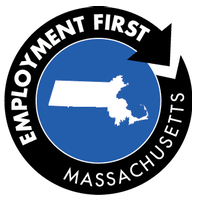Partnering with Schools to Serve Transition-Age Youth: Berkshire County Arc, Pittsfield, MA
Background
Berkshire County Arc first started providing contracted school-to-career services in 1996 with one Lenox High School student. The high school contacted Berkshire County Arc because the student’s parents wanted more vocational services for their daughter. This first case was a success—the student got a job right out of high school—and Berkshire County Arc has provided similar services to Lenox High School students ever since. They also started contacting other special education directors in the area to initiate conversations on the need for school-to-career services. Berkshire County Arc now contracts with all ten school systems in the Berkshires to provide school-to-career services.
Implementation
Berkshire County Arc is contracted by schools to provide vocational evaluations, internships, career planning, support for full- and part-time jobs, and parental education. The agency works with the special education directors and school personnel from each district to identify students with whom they will work.
Services are funded through contracts directly with school systems and are tailored to each school’s needs and existing vocational services. For example, in some schools the Berkshire County Arc does the vocational evaluation and the school uses the evaluation findings to guide subsequent services and supports. For others, Berkshire County Arc provides a more complete package. In Lenox, for example, the school provides prevocational instruction and some jobs within the school. Berkshire County Arc gets involved around age 16-18, providing a vocational evaluation that involves exposure to a variety of work settings in the community. This evaluation is the starting point for the student’s vocational services, then internships, part-time jobs, and career planning are provided to the individual with Berkshire County Arc providing the job placement and job coaching supports. Families are involved throughout the process. Berkshire County Arc connects families with other resources, such as the family support center, Independent Living Center, transportation systems, and Social Security Administration. The Department of Developmental Services and Massachusetts Rehabilitation Commission are also engaged in the planning process to ensure a good transition to adult services.
A few challenges for these partnerships have been:
- Funding: School budgets are tight and there is always a need to keep services cost-effective.
- Getting referrals early: With some school systems, early on Berkshire County Arc had to initiate contact with the schools or teachers to identify students who might benefit from vocational evaluation or services. More recently, as relationships with schools have been more solidified, schools have begun referring students earlier. With close partners such as Lenox High School, there is a process of ongoing communication such that both partners are aware of the students and their anticipated transition needs.
- Transportation: Public transportation doesn’t always go where the jobs are. Some schools can provide transportation, but the preference is to help students become more independent since they won’t have school services to rely on after they turn 22.
Impact
- As described by the director of Berkshire County Arc, “everybody wins” as a result of these transition partnerships:
- Most students get a job within two months of graduation. In Lenox, for example, almost every student has a job upon leaving school. Youth also gain financial, social, and personal growth as well as connection to the community. -Families are oriented to adult services earlier, which reduces their anxiety about the transition to adult services. Generally the transition from school to adult services is very smooth.
- Schools can claim successful outcomes for their students.
- Berkshire County Arc obtains better outcomes faster for those whom they go on to serve as adults, since most participants already have a job by the time they enter adult services.
- Providing employment supports during high school also benefits adult service agencies such as MRC and DDS, because students enter the adult service system ready to work or already working. Adult services resources can then be used to support job retention and job growth.
Suggestions for Replication
Recommendations for providers:
- Secure and solidify services, resources, and marketing materials up front. It’s important to have the capacity to provide services (such as vocational assessments, job development, and ongoing supports) in place before approaching schools. It’s also helpful to have materials to leave with schools when you go to talk to them.
- To initiate contact with schools, starting with existing relationships.
- Ensure success with the first students referred to lay the groundwork for future partnerships.
- Be prepared for challenging individuals, especially when starting out. These are the students schools are more likely to seek outside consultation for.
Recommendations for schools:
- Start vocational services/preparation for adulthood early. Do what you can in-house. Provide as many employment preparation and support services as possible using the staff and resources already available to you.
- Be proactive. The earlier you start the transition process with students the better off you’ll be.
- Don’t be afraid to partner with an outside service provider like Berkshire County Arc to supplement what you can do yourself for students.
For More Information
Rick Hawes, Director
Berkshire County Arc
rhawes@bcarc.org
413-443-1038
Cindy Dinan,
Director of Student Services
Lenox Public Schools
shanson@lenoxps.org
413-637-5571
Jennifer Sullivan Sulewski,
Research Associate
Institute for Community Inclusion
jennifer.sulewski@umb.edu
617-287-4356
